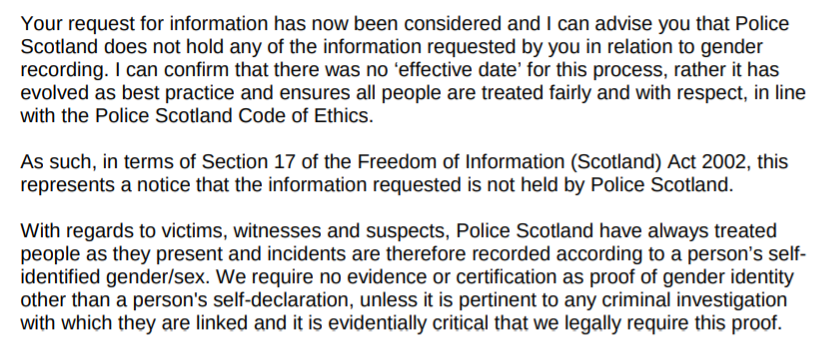Police Scotland
Following Joan McAlpine’s Paliamentary Question on 13th March which discovered that Police Scotland and the Scottish Courts and Tribunal Service both record incidents on the basis of self-declared gender identity rather than sex, one of our members sought further clarification.
This Freedom of Information request asked:
- When did Police Scotland stop recording incidents according to a person’s
biological sex and instead start recording according to self-identified gender? - Who took this decision?
- Could you please provide copies of Impact assessments?
- Which organisations and individuals were consulted, providing minutes of all
meetings and all evidence submitted? - Provide all analysis undertaken on how this would impact on the accuracy of
data collection and use?
The reply stated that Police Scotland does not hold any of the information requested; no impact assessments were carried out in line with their legal requirements under Equality laws, the practice ‘evolved’ with no start date of when this impacted on data, and quite incredibly the Police are happy to take people’s word with no requirement for proof.

Recording on the basis of gender identity alone is likely to have significant implications on the accuracy and reliability of crime and victim statistics, particularly given the differences in offending patterns between the sexes – in Scotland 98% of sexual offences are committed by men. The inclusion of even a very small number of men who identify as women can very rapidly skew the female criminal statistics.
For example, over a ten year period (2006-2015) the number of women convicted of possession of an indecent photograph of a child was 1.3 per year. In 2016, at least three men who identified as women were convicted on this charge (Alice Smith, Nat Bird, Nicola Florida), thus more than doubling the annual statistics for women.
Mumsnetters were equally perplexed at a report in the Daily Mail of of an annual figure of 6 female sex offenders who were convicted of rape, a crime that in UK law requires a penis.
According to the Criminal Proceedings in Scotland only 3 females were convicted in 2017/18 of sexual assault, compared to 299 males. Even if only a tiny proportion of these males self-identified as female, say 1%, it would effectively double the crime rate for females. Of course it remains to be seen even if the female numbers in these examples are accurate as it is no longer possible to determine the sex of the convicted person.
As with the Census investigation earlier this year, data that conflates sex and gender identity serves no-one well, with important information about each category unable to determined. It is also not consistent with the onus on public bodies to collect sex-based data in order to fulfil their legal obligations in the Equality Act 2010, where sex is defined as biological, see Annex B.
The unregulated introduction of self-declared gender and the eradication of sex as a category by Police Scotland, without justification or public scrutiny, means that we can no longer be confident in the data produced. There is no indication that sex-based data is no longer required, and indeed when males are disproportionately responsible for sexual and violent crimes it is important to be able to name, and address, the issue of male violence in society.
It has been almost three months since the Cabinet Secretary for Justice, Humza Yousaf, answered the Parliamentary Question and yet no further information or action has been forthcoming. It is vital that this situation is urgently addressed with clarification on crime recording issued in line with the requirements of equality law.
ETA: Reported in the Scotsman 03 June 2019, (archived here).
